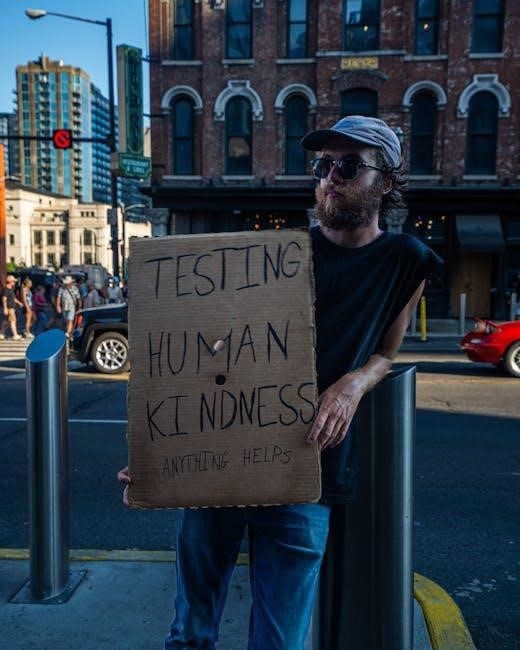Evicted: Poverty and Profit in the American City by Matthew Desmond is a Pulitzer Prize-winning exploration of housing insecurity and its devastating consequences in Milwaukee.
1.1 Overview of the Book “Evicted: Poverty and Profit in the American City”
Evicted: Poverty and Profit in the American City is a Pulitzer Prize-winning book by Matthew Desmond that examines the lives of low-income families in Milwaukee struggling with housing insecurity. The book follows eight families, documenting their experiences with eviction, poverty, and exploitation in the housing market. Desmond’s immersive research reveals the harsh realities of urban poverty and the systemic issues that perpetuate it, offering a compelling narrative on inequality and the human cost of eviction.
1.2 Background on Author Matthew Desmond
Matthew Desmond is a renowned American sociologist and professor at Princeton University. A 2015 MacArthur Fellow, he is recognized for his groundbreaking research on poverty, inequality, and housing policy. His work in Milwaukee, documented in Evicted, earned him the Pulitzer Prize in 2017. Desmond’s immersive approach and commitment to social justice have made him a leading voice in understanding urban poverty and its societal impact.
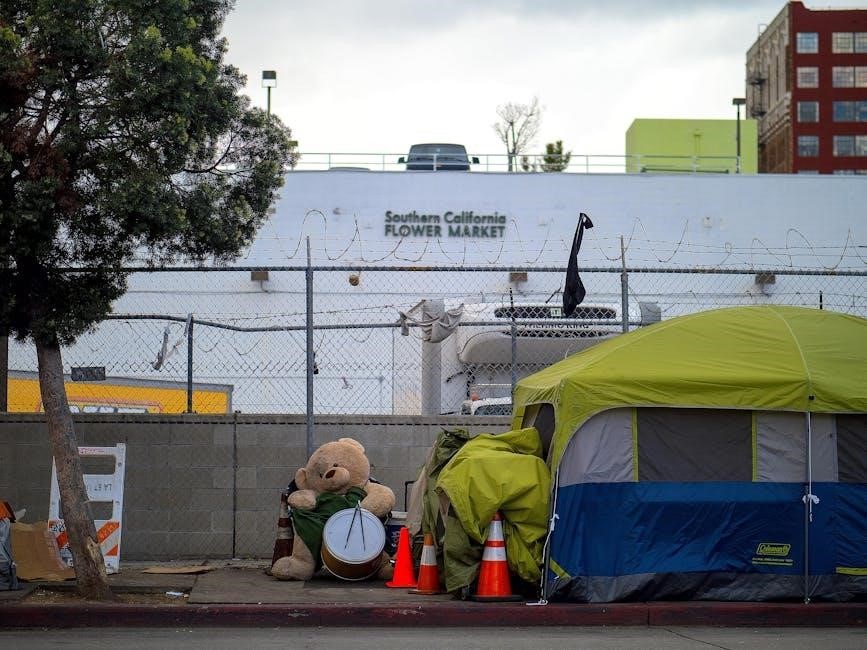
The Causes of Eviction
Poverty, lack of affordable housing, and economic instability are primary drivers of eviction, disproportionately affecting low-income families and exacerbating urban inequality and housing insecurity nationwide.
2.1 Economic Inequality and Housing Affordability
Economic inequality and housing affordability are deeply intertwined, as rising rents and stagnant wages force low-income families to spend disproportionately on housing. Desmond highlights how the 2008 financial crisis exacerbated housing insecurity, leaving many families vulnerable to eviction. The lack of affordable housing options traps families in a cycle of poverty, where even minor financial setbacks can lead to displacement. This systemic issue underscores the broader struggle of economic inequality in urban America.
2.2 Role of Poverty and Unemployment
Poverty and unemployment are central drivers of eviction, as families struggle to meet basic needs. Desmond’s research reveals that many tenants in Milwaukee spend over 70% of their income on rent, leaving little for food or healthcare. Unstable jobs and lack of social safety nets exacerbate this instability, making it impossible for families to recover from financial shocks. This cycle perpetuates poverty, trapping individuals in a relentless battle to maintain housing stability amidst scarce resources and limited opportunities.
2.3 Impact of the 2008 Financial Crisis
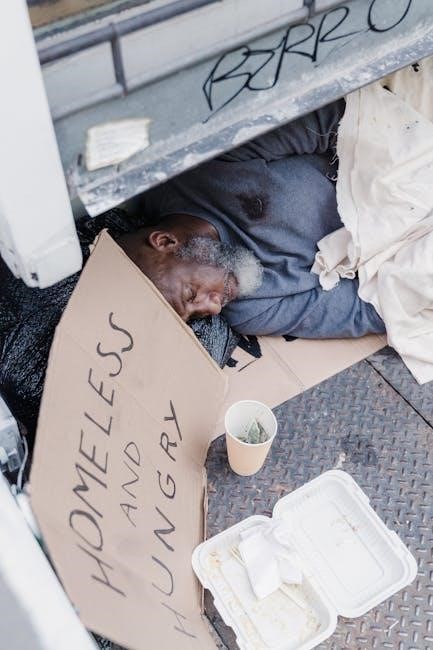
The 2008 financial crisis exacerbated housing insecurity, leading to widespread job losses and reduced income for low-income families. Many tenants in Milwaukee faced heightened eviction risks as landlords, squeezed by economic pressures, became less tolerant of late payments. The crisis deepened inequality, making it harder for families to recover financially and maintain stable housing. Desmond’s research highlights how this period intensified the vulnerability of already marginalized communities, pushing them closer to eviction and further entrenching cycles of poverty.

The Impact of Eviction on Families
Eviction disrupts family stability, causing emotional distress, financial strain, and long-term consequences for health and well-being, as documented in Desmond’s research on Milwaukee’s low-income tenants.
3.1 Psychological and Emotional Toll
Psychological and Emotional Toll of eviction is profound, leading to stress, anxiety, and depression. Families face shattered stability, feelings of shame, and hopelessness. The loss of a home disrupts routines, causing emotional trauma that lingers. Children often suffer lasting effects, while parents grapple with guilt and despair. Eviction exacerbates existing vulnerabilities, creating a cycle of mental health challenges. Desmond vividly portrays how housing insecurity deeply impacts emotional well-being, leaving scars that extend far beyond the loss of shelter.
3.2 Effects on Children and Education
Children and Education are deeply affected by eviction, as frequent moves disrupt schooling and social stability. Kids often experience anxiety and academic decline, struggling to adapt to new environments. The stress of housing insecurity impacts cognitive development and emotional well-being. Desmond highlights how eviction cycles lead to educational setbacks, perpetuating long-term disadvantages. These challenges underscore the broader societal costs of housing instability on vulnerable populations, particularly the youngest and most impressionable members of families.
3;4 Disruption of Social Networks
Eviction severely disrupts social networks, leaving families isolated and without support systems. Forced moves often separate individuals from communities, neighbors, and friends, undermining their ability to access resources like childcare or job opportunities. Desmond highlights how these disruptions exacerbate poverty, as the loss of social capital makes it harder for families to recover. The instability further marginalizes already vulnerable populations, perpetuating cycles of disadvantage and deepening their struggles to achieve stability and security in their lives.
The Role of Landlords and Property Owners
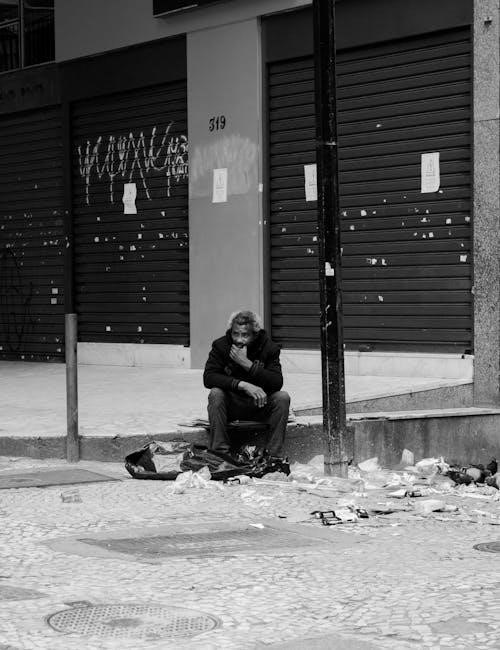
Landlords play a pivotal role in the housing market, often prioritizing profit over tenant welfare. Desmond examines how their practices contribute to housing insecurity and eviction cycles.
4.1 Profit Motives in the Housing Market
Profit motives in the housing market drive landlord behaviors, often prioritizing financial gain over tenant stability. Matthew Desmond highlights how landlords exploit low-income tenants, charging high rents while neglecting property maintenance. This exploitation exacerbates housing insecurity, as tenants struggle to afford basic necessities. The pursuit of profit creates a cycle where vulnerable populations are repeatedly displaced, further entrenching urban poverty. Desmond’s work reveals the ethical dilemmas and systemic issues perpetuated by this profit-driven approach.
4.2 Exploitation of Low-Income Tenants
Landlords often exploit low-income tenants by charging excessive rents for substandard housing. Desmond reveals how tenants are frequently forced to choose between paying rent or basic necessities, leading to cycles of debt and eviction. This exploitation is perpetuated by a lack of legal protections and affordable housing options. The book highlights how landlords profit from tenants’ desperation, exacerbating housing insecurity and deepening urban poverty. This systemic exploitation underscores the moral and economic failings of the housing market.
4.3 Legal and Ethical Issues in Eviction Practices
Eviction practices often raise legal and ethical concerns, as landlords may bypass proper legal procedures to remove tenants. Desmond highlights how tenants are frequently evicted without due process, exacerbating housing insecurity. Ethically, the prioritization of profit over tenant welfare perpetuates inequality. The book exposes how the legal system often fails to protect vulnerable tenants, leaving them at the mercy of landlords. These practices underscore the need for stronger tenant protections and ethical accountability in housing markets.
Urban Poverty and Housing Insecurity
Urban poverty and housing insecurity are deeply intertwined, as low-income families face systemic barriers to stable housing, exacerbated by economic inequality and lack of affordable options.
5.1 The Cycle of Poverty and Eviction
Poverty and eviction form a vicious cycle, where financial instability leads to housing loss, further entrenching economic hardship. Eviction disrupts lives, limiting access to stable jobs, education, and social services, making it harder to escape poverty. This cycle perpetuates inequality, as those evicted often face higher barriers to securing future housing, deepening their vulnerability to ongoing poverty and housing insecurity.
5.2 Racial and Gender Disparities in Housing
Racial and gender disparities exacerbate housing insecurity, with African-American families facing higher eviction rates compared to white families. Women, particularly single mothers, are disproportionately affected, often juggling low-wage jobs and childcare. These disparities stem from systemic discrimination, limited access to resources, and unfair housing practices. Desmond highlights how such inequalities perpetuate cycles of poverty, trapping marginalized groups in unstable living conditions and further entrenching societal inequities.
5.3 The Role of Government Policies
Government policies play a critical role in perpetuating housing insecurity. Desmond highlights how inadequate rent control laws and insufficient housing vouchers fail to protect low-income families. Additionally, policies often favor landlord interests over tenant stability, exacerbating eviction risks. Desmond argues that without comprehensive reforms, these systemic failures will continue to trap vulnerable populations in cycles of poverty and displacement, underscoring the urgent need for equitable housing policies.
Case Studies and Personal Stories
Evicted delves into the lives of eight Milwaukee families, offering a gripping narrative of their struggles with housing instability and the broader systemic issues driving eviction.
6.1 The Lives of Eight Families in Milwaukee

Matthew Desmond’s Evicted intimately chronicles the lives of eight Milwaukee families, showcasing their daily struggles with housing insecurity and poverty. Through immersive storytelling, Desmond highlights the resilience and despair of tenants like Arleen, Vanetta, and Lamar, whose lives are disrupted by eviction. These personal narratives expose the harsh realities of urban poverty, offering a humanizing perspective on systemic issues. Desmond’s ethnographic approach provides a vivid understanding of how eviction disrupts families and perpetuates cycles of inequality in America’s cities.
6.2 The Struggle to Maintain Housing Stability
In Evicted, Matthew Desmond illustrates the relentless challenges faced by low-income families in maintaining stable housing. Despite their efforts, tenants often confront impossible choices between rent and basic necessities. The book reveals how minor financial setbacks, such as medical emergencies or lost wages, can spiral into eviction. Desmond’s portrayal sheds light on the precarious existence of these families, where housing stability is constantly at risk due to systemic inequities and exploitative practices in the rental market. This struggle is both deeply personal and universally relatable.
6.3 The Intersection of Poverty and Criminal Justice
Evicted highlights how poverty and criminal justice systems intersect, perpetuating cycles of instability. Many tenants face eviction due to criminal records, which limit employment and housing options. Desmond shows how legal issues, often stemming from poverty, further entrench housing insecurity. This vicious cycle traps families in a system where eviction leads to deeper poverty, and poverty increases the likelihood of legal entanglements, creating a seemingly inescapable loop that exacerbates urban inequality and social injustice.

Policy Analysis and Recommendations
Desmond advocates for systemic changes, including rent control, tenant protections, and affordable housing initiatives, to address the root causes of eviction and housing insecurity.

7.1 Current Housing Policies and Their Failures
Current housing policies often fail to address the root causes of eviction and urban poverty. Many programs, such as Section 8 housing vouchers, are underfunded and inaccessible to millions in need. Additionally, existing eviction laws often favor landlords, leaving tenants with limited legal recourse. These systemic failures perpetuate housing insecurity, disproportionately affecting low-income and minority communities. Desmond highlights how these policies exacerbate inequality, emphasizing the urgent need for reform to protect vulnerable populations and ensure stable housing for all.
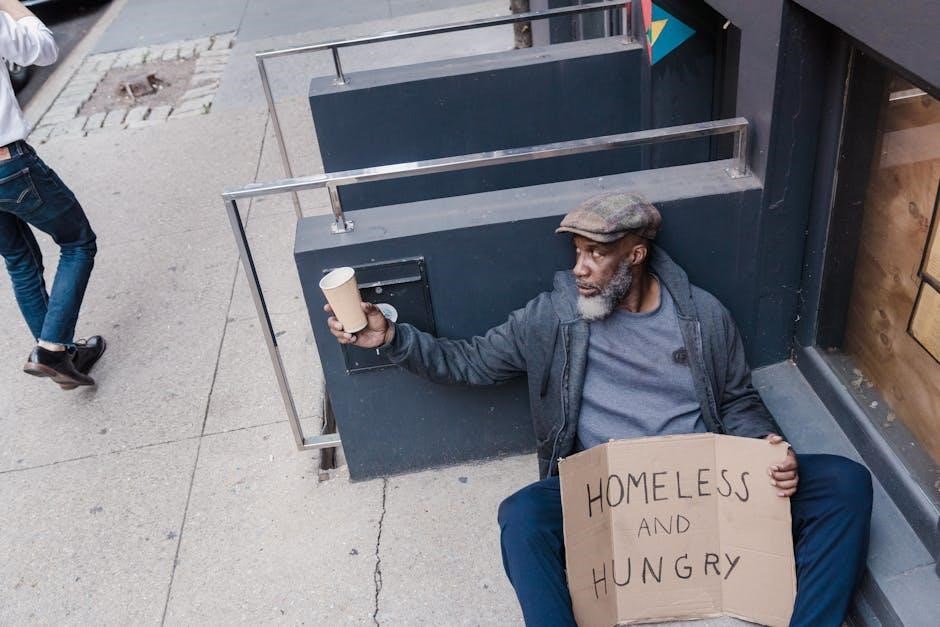
7.2 Potential Solutions to Address Housing Insecurity
Potential solutions to housing insecurity include expanding rental assistance programs, implementing universal eviction prevention policies, and increasing the supply of affordable housing. Strengthening tenant protections, such as rent control and just-cause eviction laws, can also help. Desmond advocates for a comprehensive approach that combines policy reforms with community-based initiatives to ensure housing stability. These measures aim to reduce displacement and provide vulnerable populations with sustainable pathways to housing security and economic mobility.
7.3 The Need for Tenant Protections and Rent Control
Implementing tenant protections and rent control measures is crucial to mitigate housing insecurity. Rent control can stabilize costs, preventing rapid displacement, while tenant protections ensure fair eviction processes. Desmond emphasizes the need for policies like just-cause eviction and legal aid for tenants. These reforms aim to balance landlord interests with tenant rights, fostering stability and reducing exploitation. Strengthening these safeguards is essential to address the eviction crisis and promote equitable housing access.
Evicted underscores the urgent need to address housing insecurity, highlighting the human cost of eviction and the systemic failures that perpetuate urban poverty and inequality.
8.1 Summary of Key Findings
Evicted: Poverty and Profit in the American City reveals the devastating cycle of housing insecurity, exposing how eviction perpetuates inequality and urban poverty. Desmond’s research highlights the economic and social disparities faced by low-income families, emphasizing the role of landlord-tenant dynamics and systemic failures. The book underscores the human cost of eviction, illustrating its impact on mental health, family stability, and community cohesion. These findings call for urgent policy reforms to address housing inequality and protect vulnerable populations.

8.2 The Importance of Addressing Housing Insecurity
Addressing housing insecurity is critical to breaking the cycle of poverty and inequality. Eviction disrupts families, exacerbates mental health issues, and destabilizes communities. By ensuring access to affordable housing, society can reduce homelessness, improve health outcomes, and foster economic mobility. Policymakers must prioritize tenant protections, rent control, and social safety nets to mitigate the harsh realities documented in Evicted. Housing insecurity is not just a personal crisis but a societal issue requiring urgent, systemic solutions to ensure dignity and stability for all.
